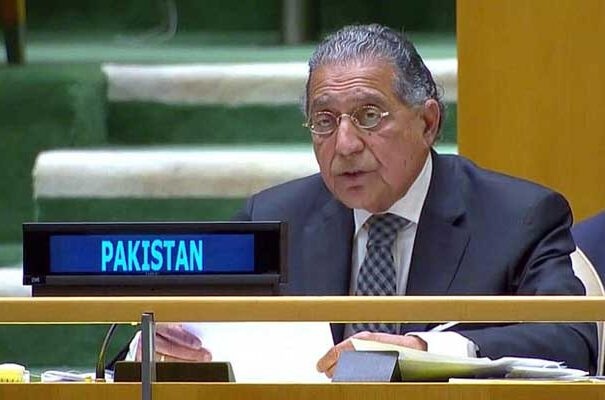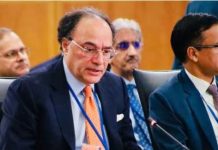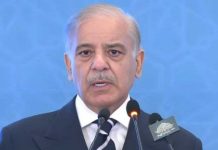NEW YORK, May 17 (APP):Pakistan’s Ambassador to the United Nations, Munir Akram, Thursday briefed a delegation of the National Defence University (NDU), Islamabad, about international and regional issues on United Nations’ agenda and Pakistan’s role at the world body.
The delegation, comprising 12 members, is led by NDU’s Chief Instructor Major General Naeem Akhtar. It is currently in the United States attending a National Security and War Course (23-24).
Ambassador Akram told the delegation that Pakistan plays an active role in all organs of the United Nations, especially highlighting the issue of vital interest to the country.
Pakistan, he told the delegation, was a candidate for a non-permanent seat on the Security Council, the UN’s power centre, for the 2025-26 term. If elected, he said, it would provide Pakistan an opportunity to contribute to the effort to promote international and regional peace and stability.
The Pakistan Mission, Ambassador Akram said, was making all possible efforts to secure implementation of the Security Council resolutions on the Jammu and Kashmir dispute, and drawing the international community’s attention to the human rights abuses in the Indian occupied territory.
Pakistan was also making a vital contribution to the UN peacekeeping operations in hot spots around the world, he said.
Ambassador Akram explained that Pakistan’s position on the various regional and global issues was in alignment with the principles and objectives of the UN Charter. Despite imperfections and failings, the UN was still a useful multilateral forum where developing countries also had a voice.
Talking about challenges facing Pakistan, he termed terrorism as a leading threat to the national security, stressing the enormous sacrifices Pakistan had made in combating terrorism.
Ambassador Akram also briefed the delegates about September’s Summit of the Future and the likely conclusion of the Pact for the Future aimed at reshaping the world order, saying Pakistan was actively involved in the negotiating process in consultation with a group of like-minded countries.
At the same time, Ambassador Akram said that the external environment was undergoing profound changes as new configurations in the international order driven by technology, geostrategic conflicts, competition between the major powers and climate change were emerging to reshape the global order.
“As the world transition from the unipolar world order to what I call ‘bipolar plus’ order, the countries are bound to adapt to the changing external environment,” he said.
The world needed to carefully weigh the options to be able to calibrate befitting policy responses.
A question-answer session followed the ambassador’s presentation in which the participants raised the challenges of peacekeeping; the ongoing Gaza conflict in the Middle East; paralysis of the UN Security Council and Sino-US competition.
The delegates also visited the United Nations Headquarters where the Office of the Military Affairs (OMA) briefed them about peacekeeping operations.
The Deputing Permanent Representative, Ambassador Usman Jadoon, and officers of the Pakistan Mission were also present on the occasion.

















